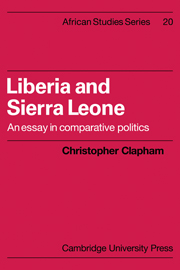Book contents
- Frontmatter
- Contents
- List of maps, tables and figures
- Preface
- Map A Liberia and Sierra Leone in West Africa
- 1 Political Comparison
- 2 Historical Summary
- 3 Resources
- 4 Rules
- 5 Political Allocation at the Centre
- 6 Centre and Periphery
- 7 Aspects of Political Economy
- 8 Concluding Review
- Statistical Appendix
- Bibliographical Note
- Notes
- Index
4 - Rules
Published online by Cambridge University Press: 15 January 2010
- Frontmatter
- Contents
- List of maps, tables and figures
- Preface
- Map A Liberia and Sierra Leone in West Africa
- 1 Political Comparison
- 2 Historical Summary
- 3 Resources
- 4 Rules
- 5 Political Allocation at the Centre
- 6 Centre and Periphery
- 7 Aspects of Political Economy
- 8 Concluding Review
- Statistical Appendix
- Bibliographical Note
- Notes
- Index
Summary
RULES AND SOCIAL EXPLANATION
Politics, in common with other social sciences, has to find some way to explain actions, without recourse to the general causal laws which apply at least in some of the natural sciences, but which are excluded from social science explanation by human free will (and hence unpredictability), and by the complexity of social situations. At the same time, human actions do in fact display a fair degree of regularity, and so it is tempting to seek to explain them by using some concept which attempts to order the no-man's land between causal law explanation on the one hand, and random behaviour on the other. This is where ‘rules’ come in; but since there is little agreement as to what the term should mean or how it should be used, I must offer my own interpretation before going further.
Rules, as I use the word, are a means of indicating the constraints on political behaviour. Politicians are not free to do as they will in their pursuit of prizes, even if the resources at their disposal are fixed. They are limited, partly by the legal requirements of the system in which they operate, partly by moral norms and expectations, and partly by their own estimates of what is prudent, or worth risking, in the situation at hand. All of these factors constitute rules, which between them order the operating environment of the politician. They establish the prizes which the system has to offer, indicate the means by which these can be competed for, and hence favour or disfavour the particular skills and resources at a politician's command.
- Type
- Chapter
- Information
- Liberia and Sierra LeoneAn Essay in Comparative Politics, pp. 33 - 45Publisher: Cambridge University PressPrint publication year: 1976

